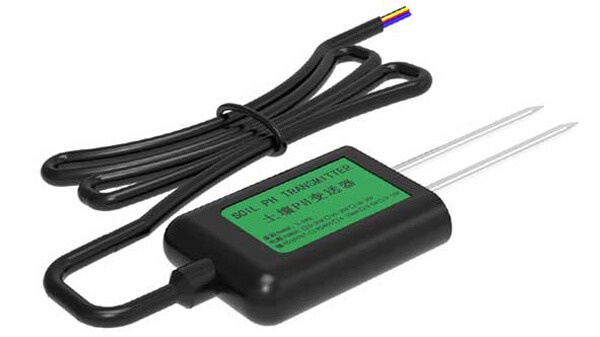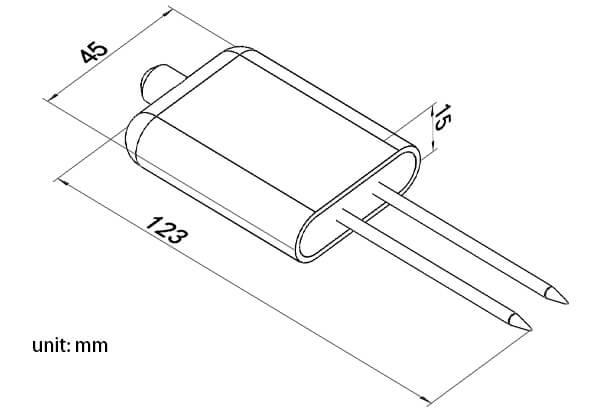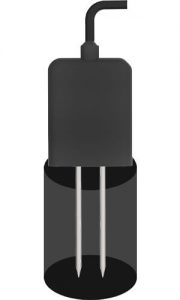Soil Moisture Sensor FAQ
Soil moisture is the source of the survival of plants. Soil moisture refers to the moisture content of the soil.
The soil pH sensor is a device that measures the current pH of the soil. It detects the pH value of the soil by inserting two stainless steel probes vertically into the soil. We offer rs485 soil ph sensor, 0-5V soil ph sensor, 0-10V soil ph sensor, and 4-20ma soil ph sensor. This sensor can be used with our soil data logger.

Soil ph refers to the current pH of the soil, which plays an important role in the growth of plants. Plants can grow normally in a wide range, but various plants have their suitable pH. Reasonable control of the soil pH value is conducive to the healthy growth of crops.
RS-PH-N01-TR-1 is a soil PH sensor developed by our company. The soil sensor has high accuracy, fast measurement speed, stable output, and can be widely used in various soils. The sensor shell adopts vacuum potting, IP68 protection grade, can be buried in the soil for a long time, can withstand long-term electrolysis and corrosion.
1. The Renke soil pH sensor is simple to use, has few operating steps, does not need to add reagents, and does not limit the number of detections.
2. The measurement accuracy of the sensor is high, up to ±0.3PH accuracy, and the response speed is very fast.
3. The electrode is made of specially treated alloy material, which can withstand strong external impact and is not easy to damage.
4. The sensor shell is completely sealed, resistant to acid and alkali corrosion, and can be buried in the soil for long-term dynamic detection.
5. The probe plug-in design ensures accurate measurement and reliable performance.
6. You can check the data through the free cloud platform offered by us.
Power supply: 5-30VDC
Maximum power consumption: 0.5W
Measuring Range: 3—9 PH
Resolution: 0.1
Operating temperature: -20℃~60℃
Long-term stability: ≤5%/year
Response time: ≤10S
Protection level: IP68
Probe material: Anti-corrosion special electrode
Sealing material: Black flame-retardant epoxy resin
Output signal: RS485/4~20mA/0~5V/0~10V
Dimensions: 45*15*123mm

When using it for the first time, you need to plug it in the soil several times to remove the oxide film on the surface of the probe. Then insert the probe vertically into the soil, which requires avoiding rocks. Besides, you can manually dig a pit in the ground, then insert the sensor horizontally into the pit wall and bury the map.
The measurement area is a cylinder with a diameter of 5 cm and the same height as the probe with the center of the two probes as the center. As the picture shows:
Measuring area:
φ=5cm, cylinder with the same height as the probe
1. All probes must be inserted into the soil during measurement.
2. Pay attention to lightning protection when used in the field.
3. Do not bend the probe violently, pull the lead wire of the sensor forcefully, and do not hit or hit the sensor violently.
4. The sensor’s protection grade is IP68, and the sensor can be soaked in water.
5. Due to the presence of radiofrequency electromagnetic radiation in the air, it is not suitable to stay energized in the air for a long time.

Soil moisture is the source of the survival of plants. Soil moisture refers to the moisture content of the soil.
The weather sensors are the sensing end of the weather station and collect various weather-related data. The weather station can
Soil nutrients are the basis for plant growth. Just like human beings eat, they obtain various nutrients for the body’s
Soil moisture sensors are also known as soil moisture meters. It is mainly used for measuring soil volumetric water content,
Whether it is farmland or a garden, the most important thing for crops to grow and bloom beautifully is soil.
Water is an important part of plant growth, and plants cannot survive without water. Nutrients are the basis for the
Introduction of the agricultural production environment monitoring system: The agricultural production environment monitoring system is composed of greenhouse environment monitoring
The soil data logger can measure various parameters such as soil temperature, water content, PH value, conductivity, nitrogen, phosphorus, potassium,
Only when the soil pH value is about 6.5, the absorption and utilization of nutrient elements are the highest, which
What is soil sensor? Soil sensors are instruments used to monitor soil moisture conditions. They can be categorized into sensors